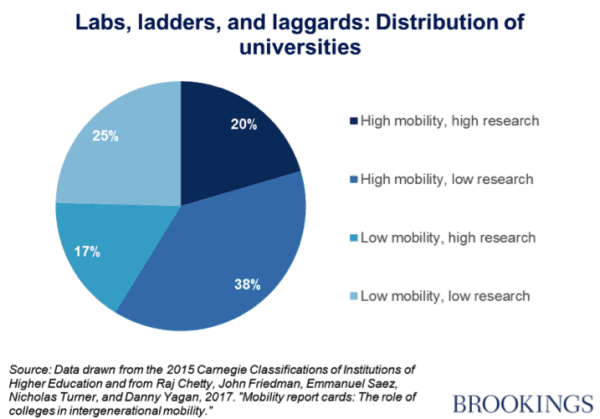UNC Charlotte Named “Leader” for Commitment to Social Mobility and Research

by: Julia Stullken, Master of Public Health student
UNC Charlotte was recently named a “Leader” by the Brookings Institution. Brookings is a nonprofit policy organization that conducts research that encourages innovative ways to solve societal issues. Their recent article, titled “Ladders, labs, or laggards? Which public universities contribute most” analyzes the efforts of hundreds of public four-year universities across the US and places them into three domains: ladders, labs or laggards. Ladders are institutions that provide opportunity for social mobility, and whose students climb the social ladder at a higher rate than others. Labs are institutions that promote knowledge by producing high quality research. Laggards are institutions that lag behind the others, ranking low in both social mobility and research. Brookings then went a step further and identified schools that contribute to both social mobility and research, and named these Leaders. UNC Charlotte is among the 20% of schools studied to fall into the Leader category.
What makes UNC Charlotte a Leader?
UNC Charlotte’s commitment to acesss means we value every student’s opportunity to learn while keeping tuition rates as low as possible. This strategy affords an opportunity for both traditional and nontraditional students to attend college who may not otherwise be able to, which in turn encourages upward social mobility. UNC Charlotte also values research, social mobility, and community partnerships, as evidenced by hundreds of published journal articles every year and numerous organizations and academies devoted to service, partnerships, and learning. As an urban institution, we’re able to leverage wide networks to spread knowledge and resources throughout the largest metropolitan area in North Carolina.
Understanding the concept of a research institution is quite simple, but understanding social mobility is a bit more complex. The Brookings Institute calculates mobility as the proportion of students from the bottom 20 percent of family income who reach the top 20 percent of earning potential. High mobility doesn’t imply causation between a school’s efforts and actual outcomes, but it does give us a foundation for understanding the relationship between increasing access and opportunities for success. UNC Charlotte’s role in improving economic and social mobility is extremely important because Charlotte needs help. A study conducted in 2014 found that Charlotte ranked 50th out of 50 large cities in the US in terms of mobility. In response to this report, Charlotte community leaders wasted no time establishing the Opportunity Task Force, who published five strategies and recommendations for the city. While Charlotte has made some improvements, there is still a long way to go.
One way to foster success is by working with local stakeholders to understand the needs and resources for not only students but the community they will be re-entering upon graduation.
An example of this type of dedication is a recent workshop conducted by the Department of Public Health Sciences with master of Public Health (MPH) students and community leaders. The Inter-Professional Community Workshop took place at the Center City Campus on March 16th and included eight leaders from community-based organizations and 26 second-year MPH students. The objective of the workshop was to use an inter-professional approach to brainstorm ways that UNC Charlotte can be better connected to the Charlotte community. Community partners represented a wide range of interests, including literacy, public transportation, faith-based organizations, and healthcare systems. The immediate importance of the event is that it provided a starting point at which stakeholders from a variety of backgrounds could come together and think about the areas where they intersect and how these intersections can be used to create measurable impact. The long-term implications are some incredible ideas for leveraging UNC Charlotte resources and research for the benefit of our great city.
Although we are Leaders, the work is not done. UNC Charlotte will continue to put an emphasis on access and high-quality research in every department and discipline across campus. Students and faculty will continue to lead by example by cultivating meaningful relationships within the community and among other important Charlotte institutions.
Sources: